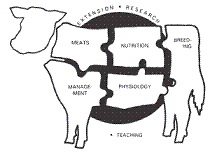Animal Science, Department of

Nebraska Beef Cattle Reports
Date of this Version
2023
Citation
2023 Nebraska Beef Cattle Report
UNL Beef, Institute of Agriculture and Natural Resources, University of Nebraska-Lincoln
Abstract
This study compared estrus synchronization, estrus response, and artificial insemination pregnancy rates of beef heifers fed melengestrol acetate the normal 14-day period or extended to an 18-day period using the melengestrol acetate -prostaglandin- heat detect and timed artificial insemination protocol. Therefore, the purpose of this study was to evaluate if extending melengestrol acetate feeding by 4 days increases the number of heifers ovulating, which would result in greater estrus response and pregnancy rate in the whole herd. Early estrus response following prostaglandin administration occurred in heifers who averaged an earlier estrus response after melegestrol acetate withdrawal but extending the melengestrol acetate feeding period did not increase herd estrus synchronization, estrus response, or pregnancy rate. When necessary, producers may consider extending melengestrol acetate feeding an alternative option without significant differences in pregnancy rate (i.e.: scheduling conflicts).
Included in
Large or Food Animal and Equine Medicine Commons, Meat Science Commons, Veterinary Preventive Medicine, Epidemiology, and Public Health Commons

